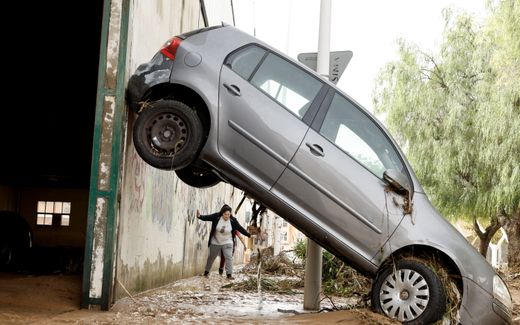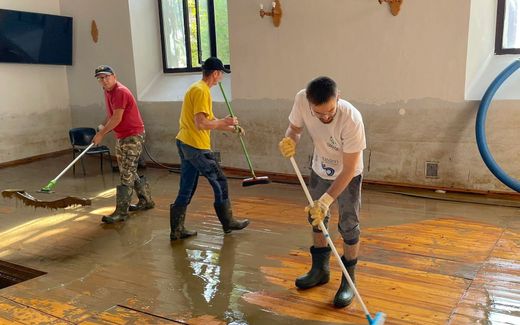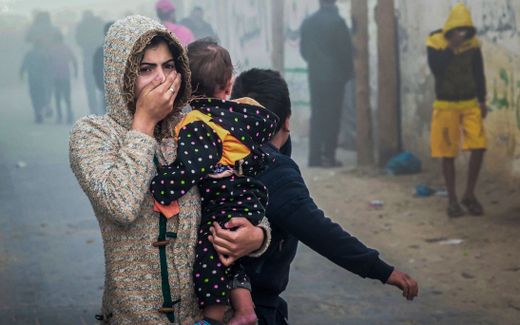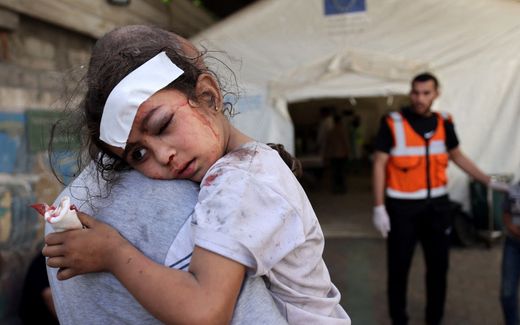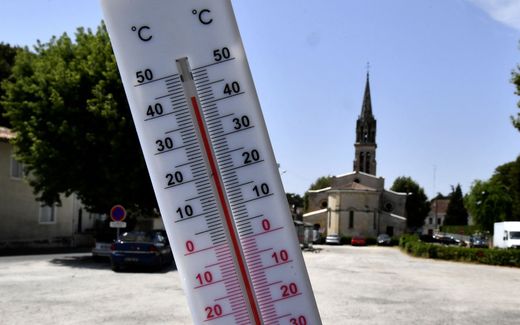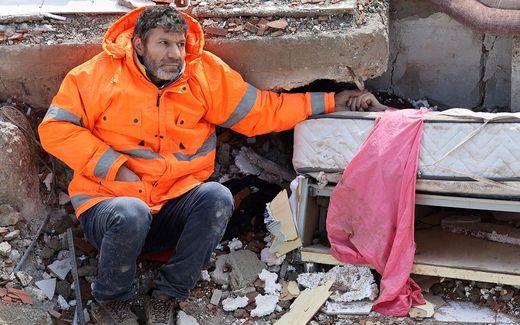This is how the floods in Spain show much discoordination of authorities
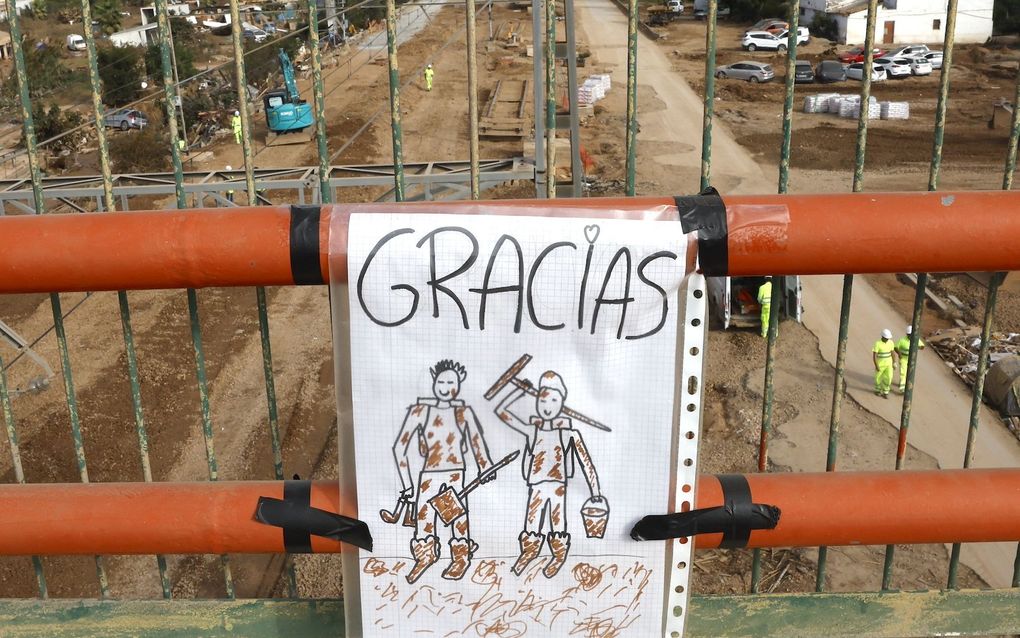
A sign of gratitude in Valencia, Spain. Photo EPA, Chema Moya
Southern Europe
Last week, all TV screens and newspapers were filled with startling images from Paiporta, a town in Valencia. The people were screaming at the Spanish royals, the regional president Mazón, and the Spanish Prime Minister Sánchez.
Stay up to date with Christian news in Europe? Sign up for CNE's newsletter.
Prime Minister Sánchez even was hit by a stick. Before the royal couple did, he and Mazón decided to leave the town that was hit by floods.
In contrast, King Felipe and Queen Letizia chose to remain, to listen to and encourage the people. A recurring question among the grievances was why, as supreme commander of the Armed Forces, the King had not dispatched the military for rescue operations. His reply remained consistent: “We live in a democracy, and we must follow the rules.”
What transpired this week in Valencia may be difficult for foreign audiences to comprehend; indeed, it is difficult even for us here in Spain. The convoluted interplay of responsibilities across the various levels of government (regional and national) and the institutions involved renders the situation a veritable labyrinth. Allow me, however, to sketch a brief outline of events to elucidate the people’s response to their leaders.
All indications suggest that the severe flooding in Valencia resulted from tragic miscoordination between central and regional authorities – or, perhaps more gravely, sheer negligence on both sides. Each government hesitated to take the lead in response to the flood risk, seemingly waiting for the other to act, with action only taken once the flooding had already occurred.
In the early hours of October 29th, the Department of National Security (a central government body) met twelve hours before the DANA storm began, weighing the decision to warn the public of impending danger. In the end, no warning was issued.
By midday, the first warning came from the “Confederación Hidrográfica del Júcar” (a body under the central government), which cautioned of a marked increase in the Poyo River’s flow rate. At 3:21 p.m., the Valencian Community had already requested that the central government dispatch the Emergency Military Unit (UME) to certain areas. By 5:30 p.m., the regional government issued an alert concerning rising water levels in the Magro and Júcar rivers, providing instructions for the public. Yet, this alert did not reach the population. Finally, at 8:00 p.m., an alert message was sent directly to citizens’ mobile devices. By that time, the torrent had already wholly flooded the area.
This pattern of miscoordination and negligence has persisted since the floods. Spanish law sets forth three emergency response levels, with only the third level under exclusive central government control. Additionally, the Spanish Constitution allows for a “state of alarm” to be declared in severe cases, enabling the central government to take complete charge of emergency management.Remarkably, the only military presence on the ground since the night of October 29th has been the UME. Criticism has been levelled at the Valencian government for not granting the UME permission to operate in specific places. The regional authorities, however, question why the central government has not elevated the emergency level to Level 3.
Indeed, it is perplexing that the central government has yet to declare a state of alarm, especially given that the floods have impacted not only Valencia but four autonomous communities. Furthermore, the central government has declined offers of assistance from abroad (including two hundred French firefighters) and has not requested help from the European Union.
In fact, the first detachment of non-UME military personnel was dispatched a full four days after the flooding, comprising a mere 500 soldiers. This late, limited deployment has left many puzzled, with numerous reports circulating online from military personnel who feel their efforts are severely restricted.
The population faced particularly critical conditions in the initial days following the flood. Over 100,000 people were buried under mountains of vehicles, mud, and debris, and were left without electricity, potable water, and food. Given the tragedy’s scale, neither the regional nor the central administration has mounted a sufficient response.
Volunteers from unaffected areas of Valencia have primarily provided food and water. This has also been the case for cleanup efforts, with civilians across Spain mobilising to deliver food, clothing, and essential supplies.
Regrettably, some local politicians have sometimes obstructed this aid, confiscating supplies destined for affected areas; in some cases, aid intended for Valencia was even sent to the dump site.
Official casualty figures remain unconfirmed, with early reports citing over 200 deaths and many still missing. Sadly, it is feared that the final toll may be tragically higher.
Amidst all this, the most heartening response has undeniably been from the Spanish people, initially in Valencia and then across the country. Evangelical churches and believers, like others, have suffered from the flood: church buildings, pastoral housing, and believers’ homes have all been affected.Many churches elsewhere have begun collecting food, water, and supplies to send to Valencia; however, questions remain as to how aid distribution will be managed afterwards in Valencia.
Notably, a Spanish-Romanian evangelical church (Biserica Pentecostala Betel Museros) has established a website that provides real-time updates and coordinates aid efforts in the affected areas, including cleanup and food distribution tasks.
Also, our congregation in Rubí, in the Barcelona area, maintains a “preaching station” in the Valencia area. Thankfully, none of our folks there have been affected by the floods. They, too, have volunteered in the relief and cleanup efforts in the affected zones.
Our Barcelona congregation has begun collecting provisions to send to Valencia. However, we have ultimately deemed direct financial contributions to be more effective, allowing our brethren in Valencia to purchase and distribute supplies locally.
Related Articles


